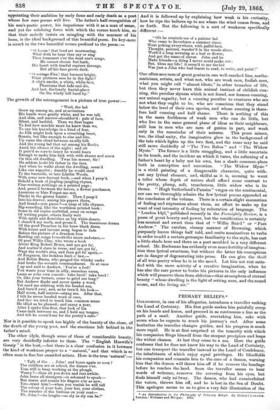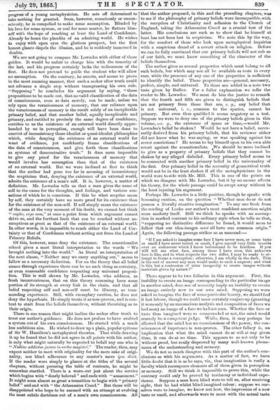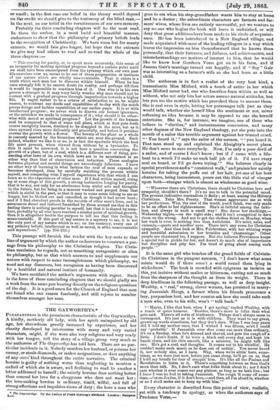PRIMARY BELIEFS.* GoLnsmirrn, in one of his allegories, introduces a
traveller seeking the Land of Certainty. His first guide makes him painfully creep on his hands and knees, and proceed in as continuous a line as the path of a snail. Another guide, overtaking him, asks with scorn when he expects to reach his journey's end. After some hesitation the traveller changes guides, and his progress is much More rapid. He is at first surprised at the temerity with which his companion flings himself from the steepest precipices and leaps the widest chasms. At last they come to a sea. Here the guide confesses that he does not know his way to the Land of Certainty, but can transport the traveller instead to the Land of Confidence, the inhabitants of which enjoy equal privileges. He blindfolds his companion and commits him to the care of a demon, warning him that the demon will throw him off if he remove the bandage before he reaches the land. Soon the traveller seems to hear words of welcome, removes the covering from his eyes, but finds himself only midway. The demon, who had counterfeited the voices, throws him off, and he is lost in the Sea of Doubt. This apologue seems to us to give a very fair illustration of the •
As Istrolitsclion to the Philosophy of Prim:try Beliefs. By lltellarl &model. London: Williams and Norgate. 1865. progress- of a young metaphysician. He sets off determined to take nothing for granted. Soon, however, consciously or uncon- sciously, he is compelled to make some assumption. Blinded by his love for some system, or zeal for some master, he flatters him- self with the hope of reaching at least the Land of Confidence. Already he hears the plaudits of an admiring world. He wishes to enjoy with open eyes the glorious prospect, but the first honest glance dispels the illusion, and he is suddenly immersed in doubts.
We are not going to compare Mr. Lowndes with either of these guides. It would be unfair to charge him with the temerity of the last, and his progress certainly lacks the tediousness of the first. He doss not pretend to guide the student who will allow no assumption. On the contrary, he asserts, and seems to prove in the most amusing manner, that such a seeker after truth could not advance a single step without transgressing his own rule. " Supposing " he concludes his argument by saying, "these propositions to be made out, that no valid classification of the data of consciousness, even as data merely, can be made, unless -we rely upon the veraciousness of memory, that our reliance upon the veraciousness of memory is the result solely of an inexplicable primary belief, and that another belief, equally inexplicable and primary, and entitled to precisely the same degree of confidence, certifies to us the existence of an external world directly appre- hended by us in perception, enough will have been done to convict of inconsistency those idealist or quasi-idealist philosophies which, while denying the existence of an external world for want of evidence, yet confidently frame classifications of the data of consciousness, and give forth those classifications as systems of demonstrative truth." It does seem impossible to give any proof for the veraciousness of memory that would involve less assumption than that of the existence of an external world. But we were inclined at first to think that the author had gone too far in accusing of inconsistency the scepticism that, denying the existence of an external world, admits the existence of a man's self. It is, however, a matter of definition. Mr. Lowndes tells us that a man gives the name of self to the cause for the thoughts, and feelings, and various sen- sations of which he is conscious. If this be what sceptics mean by self, they certainly have no more proof for its existence than for the existence of the non-self. If self simply mean the existence of the man at the very moment of his doubt, we cannot but think " cogito, ergo sum," at once a point from which argument cannot drive us, and the furthest limit that can be reached without as- sumptions as great as that of the existence of an external world. In other words, it is impossible to reach either the Land of Cer- tainty or that of Confidence without setting out from the Land of Primary Beliefs.
Of this, however, some deny the existence. The sensationalist school gives a most literal interpretation to the words "We brought nothing into the world." As literal an interpretation of the next clause, "Neither may we carry anything out," seems to follow as a neceasary deduction. For on the theory that all belief comes through experience there can be no such thing as certainty, or even reasonable confidence respecting any universal proposi- tion. This is well shown by Mr. Lowndes, who adduces, as fresh inconveniences, that on this theory reasoning loses some portion of its strength at every link in the chain, and that all belief respecting self and non-self mast be illusory, as tran- scending experience. Still, with exemplary caution, he does not deny the hypothesis. He simply treats it as non-proven, and is con- tent to start from the beliefs themselves, without theorizing as to their origin.
There is one reason that might incline the seeker after truth to trust our author's guidance. He does not profess to have evolved a system out of his own consciousness. He started with a much less ambitious aim. He wished to draw up a plain, popular epitome of Sir W. Hamilton's metaphysical theories. That while drawing it up he found that he did not agree in all points with his author, is only what might naturally be expected to befall any one who is " Nuilius culdictits jurare in verba magistri." The reader, then, may expect neither to meet with originality for the mere sake of origi- nality, nor blind adherence to any master's mere ipse If the reader were simply to glance at the titles of the several chapters, without perusing the table of contents, he might be somewhat startled. There is a worn-out jest about the service which begins with "dearly beloved" and ends with "amazement." It might seem almost as great a transition to begin with "primary belief" and end with "the Athanasian Creed." But those will be disappointed who hope to be amused with an attempt at evolving the most subtle doctrines out of a man's own consciousness. All
that the author proposed, in this and the preceding chapters, was to see if the philosophy of primary beliefs were ineompatible,with. the reception of Christianity and adhesion to the Church of England, taking the Athanasian Creed as a crucial test of the latter. His conclusions are such as to show that he himself at least has not been lost in scepticism. We note this by the way, for the comfort of those who look upon metaphysical inquiries with a suspicious dread of a covert attack on religion. Before we can be fully convinced that our primary beliefs will not rob us of our faith, we must know something of the character of the beliefs themselves.
The author gives us several properties which must belong to all such beliefs, but which may not all be available as tests in every case, while the presence of any one of the properties is sufficient to identify the belief. These properties are—general, necessary, perfect, simple, and universal. To these are added in a note two tests given by Baffler. For a fuller explanation we refer the reader to Mr. Lowndes. We must do him the justice to remark that the fourth and fifth are given to distinguish beliefs that are not primary from those that are, e. g., any belief that is not universal, i. e., common to the species, cannot be primary. But even thus qualified it seems nugatory as a test. Suppose we were to deny one of the primary beliefs given in this volume, —e. g., the existence of space or time,—would Mr. Lowndes's belief be shaken? Would he not have a belief, neces- sarily derived from his primary beliefs, that his reviewer either did not know what he was saying, or was speaking against his secret convictions ? He seems to lay himself open to his own able retort against the sensationalists. .,We should be more inclined to give as a property of primary beliefs that they cannot be shaken by any alleged disbelief. Every primary belief seems to be connected with another primary belief in the universality of the fast. Our primary belief in the necessity of geometrical truth would not be in the least shaken if all the metaphysicians in the world were to side with Mr. Mill. This is one of the points on which we disagree with Mr. Lowndes, but it by no means affects his theory, for the whole passage could be swept away without in the least injuring his argument.
Perhaps Mr. Lowndes is a little positive, though he speaks with becoming caution, on the question "Whether men do or do not possess a literally creative imagination." To any one fresh from the reading of Locke our author's most confident assertion might seem modesty itself. Still we think he speaks with an assump- tion in marked contrast to his ordinary style when he tells us that, "supposing no distinctive difference be found, it would seem to follow that our idea-images must all have one common origin." Again, the following passage strikes us as unsound:— "If I am asked to imagine some face I have never seen, or some taste or smell I have never tasted or smelt, I give myself very little trouble over an endeavour which I know beforehand to be fruitless. If you will tell me what face, among those I have seen, this unknown face is like, and in what respects the two differ, I may be ready to at- tempt to frame a conception ; otherwise, I am wholly in the dark. This is the sort of answer any man would make to such a request; and what is this but a confession of utter incapacity to create images without materials given by nature ?"
Thera appear to be two fallacies in this argument. First, the inability to create an image corresponding to the particular image in another mind, does not of necessity imply an inability to create an image entirely new to our own mind. Supposing we were asked to imagine the face of some particular beauty, we should feet it lost labour, though we could most certainly conjure up (granting it were only by an unconscious analysis and composition of faces we had seen) an image of a face we had not seen. Whether the face or taste thus imagined were so compounded or not, the mind wouldi scarcely be a competent judge. While, then, it may perhaps be allowed that the mini has no consciousness of the power, the con- sciousness of impotence is non-proven. The other fallacy is, an implication that what the mind cannot do at will at any given time, it can do at no time. This appears to us not only to be without proof, but really disproved by many well-known pheno - mena of the understanding and memory.
We do not so much disagree with this part of the author's con-
clusions as with his arguments. As a matter of fact, we have little doubt that it is as he says, viz., that imagination is really a faculty which recomposes elements all of them given in perception or memory. Still we think it impossible to prove this, while the contrary could only be proved by testimony or individual expe-. Hence. Suppose a man born blind were to tell us, after receiving sight, that he had whilst blind imagined colour ; suppose we our- selves were to imagine, we know not how, the impression of a new taste or smell, and afterwards were to meet with the actual taste
or smell ; in the first case our belief in the theory would depend on the credit we should give to the testimony of the blind man,— in the next, on our belief in the veraciousness of our own memory.
Probably the three concluding chapters will be the most read. In them the author, in a most lucid and beautiful manner, endeavours to show that the philosophy of primary beliefs leads to the recognition of Christianity. We have room but for scanty extracts, we would fain give longer, but hope that the extracts we give may lead others to read and re-read the whole of the three chapters :—
" This craving for parity, or, to speak more accurately, this sense of an incapacity for making spiritual progress beyond a certain point until we shall have been emancipated from the tyranny which our own past life exercises over us, seems to be one of those propensities or instincts of our nature which are wholly unaccountable. That it exists is a truth which each man has to discover within himself. When he has own strongly felt it he cannot doubt its reality, and perhaps till then it would be impossible to convince him of it. One who is in his own person a stranger to it may very fairly wonder why men should not be content with a gradual progress through imperfection towards a higher life. It ought rather to be a source of satisfaction to us, he might reason, to contrast our deeds and capabilities of to-day with the much poorer doings and feebler capabilities of our earlier years. It is so with intellectual progress ; we never wish to disown our former ignorance, or the mistakes we made in consequence of it ; why should it be other- wise with moral or spiritual progress ? Let the growth of the human soul be compared to that of some tall plant, which at first puts forth coarse unsightly leaves, destined to be draggled in the mire, but as it rises upward rises more delicately and gracefully, and before it perishes crowns the growth with a flower. The beauty of the plant as a whole is scarcely marred by the blemishes which are near the ground. Such indeed, whether we like it or no, is in fact the spectacle which the best life must present, when viewed from without by a bystander. To • this it must be answered, it is not here a question concerning the growth of a plant, but of a soul, which is a different sort of thing, pro- ceeding after laws of its own, which laws are to be ascertained in no other way than that of observation and induction. These analogies between physical and mental things are exceedingly fallacious. I have no other way of learning in what fashion the soul of man expands or becomes developed, than by carefully watching the process within myself, and comparing what I myself experience with that which I can learn as to the experiences of other men. If I find within myself, rising up at some stage of this growth, a strong instinctive longing for purity, that is to say, not only for an abstinence from sinful acts and thoughts in the future, but for being in a manner washed and purged from that which is sinful in the past, so that it may in some sense belong to me no longer' but be blotted out and cancelled, as though it had never been ; and if I find abundant proofs in the records of other men's lives, and in assurances direct and indirect furnished by those around me that in this feeling there is nothing peculiar to myself, but that it is shared by num- bers, probably by all who have reached a similar point of spiritual growth, then it is altogether beside the purpose to tell me that this feeling is unaccountable. If this part of my nature is a mystery to me, it is not the only part of my nature which is so; on the contrary, every one of my primary beliefs, intellectual as well as moral, is alike unaccountable and mysterious." (pp. 254-255.)
This passage will furnish the reader with the key-note to that line of argument by which the author endeavours to construct a pas- sage from his philosophy to the Christian religion. The Chris- tian revelation he regards, not as something antagonistic or alien to philosophy, but as that which answers to and supplements our tature with respect to some incompleteness which philosophy, we sued not say discovers, but recognizes as having been discovered by a healthful and natural instinct of humanity.
We have mutilated the author's arguments with regret. Such -is the force of these concluding chapters that we should gladly see a work from the same pen bearing directly on the religious questions of the day. It is a good omen for the Church of England that men are found who can reason fearlessly, and still rejoice to number themselves amongst her sons.
































 Previous page
Previous page